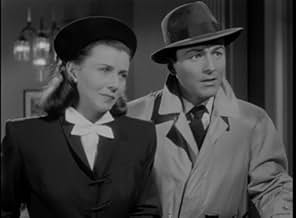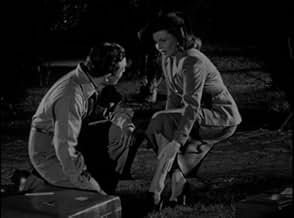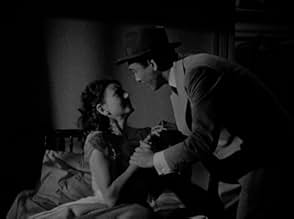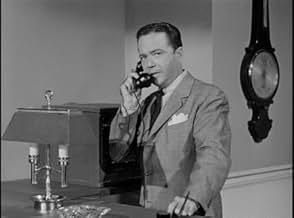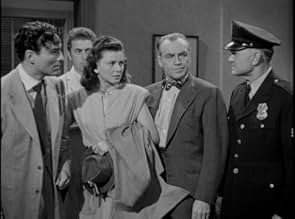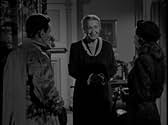Ajouter une intrigue dans votre langueOn his wedding eve, a groom's fiancée vanishes. Hiring a detective, he's drawn into a sinister conspiracy surrounding her ex-husband's death and his shady in-laws.On his wedding eve, a groom's fiancée vanishes. Hiring a detective, he's drawn into a sinister conspiracy surrounding her ex-husband's death and his shady in-laws.On his wedding eve, a groom's fiancée vanishes. Hiring a detective, he's drawn into a sinister conspiracy surrounding her ex-husband's death and his shady in-laws.
- Réalisation
- Scénario
- Casting principal
Abigail Adams
- Traynor's Secretary
- (non crédité)
Gertrude Astor
- Hotel Guest
- (non crédité)
Trevor Bardette
- Arnold
- (non crédité)
Steve Benton
- Male Nurse
- (non crédité)
Dolores Castle
- Nurse
- (non crédité)
Edgar Dearing
- Police Captain Griggs
- (non crédité)
Ann Doran
- Sybil Barkley
- (non crédité)
Otto Forrest
- The Whistler
- (voix)
- (non crédité)
Wilton Graff
- Dr. Bertram H. Grantland
- (non crédité)
Olin Howland
- Jeff Anderson
- (non crédité)
Robert Emmett Keane
- Hart
- (non crédité)
Kenner G. Kemp
- 2nd Male Nurse
- (non crédité)
Avis à la une
I hate reading reviews that say something like, 'Don't waste your time, this film stinks on ice.' It does to that reviewer yet for me, it may have some sort of naïve charm. If you like the other 'Whistler' series films, this one will be watchable. If you like 40s noirish films, this one will be watchable.
This film is not as good, in my opinion, as any of the earlier series entries which starred Richard Dix as the protagonist. It's much slower, and the plot is trite. You've seen this same narrative device used in many other films, and usually better.
But the acting is good, and so is the lighting, and the dialog. It's just lacking in energy and you'll likely figure out exactly what's going on and how it's all going to come out in the end not more than a quarter of the way through.
The 'Whistler' series is semi-noir, and there character, mood, lighting, camera movement and angles are more important than the story itself. But this film is not noir. It's too light weight and Hollywood innocent for that. Neither Richard Dix's character nor those of any of his ladies in the previous films had to come to a good end. You just never knew until the end.
But still, I'll recommend this one for at least a single viewing. I've watched it at least twice myself, and got a reasonable amount of enjoyment out of it both times.
This film is not as good, in my opinion, as any of the earlier series entries which starred Richard Dix as the protagonist. It's much slower, and the plot is trite. You've seen this same narrative device used in many other films, and usually better.
But the acting is good, and so is the lighting, and the dialog. It's just lacking in energy and you'll likely figure out exactly what's going on and how it's all going to come out in the end not more than a quarter of the way through.
The 'Whistler' series is semi-noir, and there character, mood, lighting, camera movement and angles are more important than the story itself. But this film is not noir. It's too light weight and Hollywood innocent for that. Neither Richard Dix's character nor those of any of his ladies in the previous films had to come to a good end. You just never knew until the end.
But still, I'll recommend this one for at least a single viewing. I've watched it at least twice myself, and got a reasonable amount of enjoyment out of it both times.
The "Whistler" series of mysteries in the 1940s was one of the immediate ancestors of "film noir." The stories were usually dark, the characters were morally ambiguous, and the shadowy, anonymous narrator ("I am the Whistler") added an extra touch of creepiness.
This last entry in the series is different from the others. It's lighter, in both senses of the word. Though it's an adequate "B" mystery, it's no grimmer than an Agatha Christie film.
The difference is partly due to the writing and directing, but the absence of Richard Dix, the aging former star who played the leads in the previous films, is a big factor. Dix had a "noir" persona if ever there was one. He looked like a man haunted by the past and worried about the future. Here he's replaced by fresh-faced young Michael Duane, who just doesn't have the same gravitas.
The plot is a variation on a familiar theme. A man's new fiancée vanishes, and he quickly realizes how little he really knows about her. The more he learns what seems to be the truth, the more it makes sense simply to forget all about her, but he can't get past the feeling that somebody is lying to him.
The mystery woman is played by Lenore Aubert, who was sort of the poor man's Hedy Lamarr in the 1940s. She's supposed to be a French widow here, though she doesn't sound terribly French. (She was actually born in Slovenia and raised in Austria, and her Gallic-sounding screen name was dreamed up by Hollywood.)
This is a decent little crime story, but it's not representative of the "Whistler" movies. If you don't happen to like it, at least give another film in the series a look.
This last entry in the series is different from the others. It's lighter, in both senses of the word. Though it's an adequate "B" mystery, it's no grimmer than an Agatha Christie film.
The difference is partly due to the writing and directing, but the absence of Richard Dix, the aging former star who played the leads in the previous films, is a big factor. Dix had a "noir" persona if ever there was one. He looked like a man haunted by the past and worried about the future. Here he's replaced by fresh-faced young Michael Duane, who just doesn't have the same gravitas.
The plot is a variation on a familiar theme. A man's new fiancée vanishes, and he quickly realizes how little he really knows about her. The more he learns what seems to be the truth, the more it makes sense simply to forget all about her, but he can't get past the feeling that somebody is lying to him.
The mystery woman is played by Lenore Aubert, who was sort of the poor man's Hedy Lamarr in the 1940s. She's supposed to be a French widow here, though she doesn't sound terribly French. (She was actually born in Slovenia and raised in Austria, and her Gallic-sounding screen name was dreamed up by Hollywood.)
This is a decent little crime story, but it's not representative of the "Whistler" movies. If you don't happen to like it, at least give another film in the series a look.
This being the final entry in the superlative Whistler series, I was expecting a dud. But it's not. Overall, the movie is definitely second rank but still representative of many of the series' better elements. The mystery sets up quickly as prospective bride (Aubert) disappears from her hotel room, leaving prospective groom (Duane) wondering what went wrong. After all, she seemed so sincere and loving. The hotel clerk (Howland, I believe) is worse than no help and may make you glad for Motel 6. The mystery deepens as detective Lane turns up clues and things begin to appear not as expected.
Duane is serviceable in the lead, replacing series regular Richard Dix. More importantly, I'm not sure how well the aging, dissipated Dix could have matched up with the innocent bridegroom role, anyway. What the entry lacks is the trademark provocative ending and the suffused atmosphere that characterize the William Castle directed entries, suggesting that Castle was more formative to the series' overall excellence than perhaps thought.
Still, it's puzzling to me that the series ended so abruptly, even without Dix. The material certainly reflected popular noirish programming of the period, so I would surmise that an audience was there. Perhaps there's an inside story. Nonetheless, in my little book, The Whistler series remains the most memorably unusual to emerge from the movie- drenched 1940's, even if this entry falls short.
Duane is serviceable in the lead, replacing series regular Richard Dix. More importantly, I'm not sure how well the aging, dissipated Dix could have matched up with the innocent bridegroom role, anyway. What the entry lacks is the trademark provocative ending and the suffused atmosphere that characterize the William Castle directed entries, suggesting that Castle was more formative to the series' overall excellence than perhaps thought.
Still, it's puzzling to me that the series ended so abruptly, even without Dix. The material certainly reflected popular noirish programming of the period, so I would surmise that an audience was there. Perhaps there's an inside story. Nonetheless, in my little book, The Whistler series remains the most memorably unusual to emerge from the movie- drenched 1940's, even if this entry falls short.
Last of the Whistler movies and the only one without star Richard Dix. The plot here is about a man (Michael Duane) whose fiancée (Lenore Aubert) disappears from her hotel the night before they are to be married. He investigates along with the assistance of a private detective. Michael Duane is okay but it's easy to see why the series didn't continue with him. Lenore Aubert is lovely. Richard Lane, usually playing Inspector Farraday in the Boston Blackie series, plays the private eye here. Great character actor Olin Howland stands out as a hotel clerk. Not a bad B movie but missing the screen presence of someone like Richard Dix. Still worth checking out if you catch it on TV one of these days.
Due to circumstances, Michael Duane and Lenore Aubert have to check into a hotel so they can get married the next day. Still unmarried, and needing to get his car fixed, Duane decides to search for a garage and pick up Aubert the next morning. The next morning however, he discovers his fiancé checked out of the hotel minutes after he left, which he cannot believe. Private detective Richard Lane overhears the conversation and decides to help him track down his fiancé. They drive back to Duane's apartment for some photos to help Lane. At the apartment Duane finds Aubert's old marriage license, she's a widow. When he hands over the photos and the license to Lane, Lane knocks him out cold and takes off! When he comes to, Duane realizes Aubert must be caught in something dangerous and heads for the estate of her dead husband, to find a clue...
Based on a short story by Cornell Woolrich, this was the last of the Whistler movies, and the only one without Richard Dix, who was in bad health (and would die the next year). It's still a worthy entry in the series, even if some of the twists are not too surprising. Duane, who had already co-starred in a another Whistler movie ('The Secret Of The Whistler') and Aubert do a decent job, as does the rest of the no- name cast. Aubert, who plays a French woman, does tend to forget her French accent quite often. Random trivia: uncredited actor Fred F. Sears would go on to direct many movies himself including a few noirs like 'Chicago Syndicate'.
While it's a B-movie, it's very lean and fast-moving thanks to director D. Ross Lederman ('Strange Alibi', 'Key Witness'), and it has above-average production values with some nice sets. The chiaroscuro cinematography by DoP Philip Tannura ('Key Witness', Edgar J. Ulmer's 'Strange Illusion') is really nice, and also features the necessary shadow of 'The Whistler' in some key scenes. All in all, not a bad way to end the series.
Based on a short story by Cornell Woolrich, this was the last of the Whistler movies, and the only one without Richard Dix, who was in bad health (and would die the next year). It's still a worthy entry in the series, even if some of the twists are not too surprising. Duane, who had already co-starred in a another Whistler movie ('The Secret Of The Whistler') and Aubert do a decent job, as does the rest of the no- name cast. Aubert, who plays a French woman, does tend to forget her French accent quite often. Random trivia: uncredited actor Fred F. Sears would go on to direct many movies himself including a few noirs like 'Chicago Syndicate'.
While it's a B-movie, it's very lean and fast-moving thanks to director D. Ross Lederman ('Strange Alibi', 'Key Witness'), and it has above-average production values with some nice sets. The chiaroscuro cinematography by DoP Philip Tannura ('Key Witness', Edgar J. Ulmer's 'Strange Illusion') is really nice, and also features the necessary shadow of 'The Whistler' in some key scenes. All in all, not a bad way to end the series.
Le saviez-vous
- AnecdotesEighth and last film of the Whistler series released by Columbia from 1944 to 1948.
- GaffesAt the end of the meeting with the hotel manager, hotel clerk, police Captain and Ted Nichols, the police Captain escorts Ted out of the office and incorrectly calls him Mr. Nicholas.
- Citations
Dr. Bertram H. Grantland: But don't worry about that, Darling--where are your clothes?
- ConnexionsFollows The Whistler (1944)
Meilleurs choix
Connectez-vous pour évaluer et suivre la liste de favoris afin de recevoir des recommandations personnalisées
Détails
- Date de sortie
- Pays d’origine
- Sites officiels
- Langues
- Aussi connu sous le nom de
- Die Rückkehr des Whistler
- Société de production
- Voir plus de crédits d'entreprise sur IMDbPro
- Durée
- 1h 2min(62 min)
- Couleur
- Rapport de forme
- 1.37 : 1
Contribuer à cette page
Suggérer une modification ou ajouter du contenu manquant

